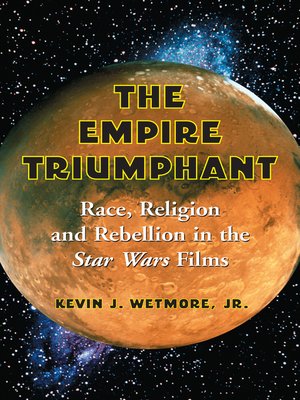The Empire Triumphant
ebook ∣ Race, Religion and Rebellion in the Star Wars Films
By Kevin J. Wetmore, Jr.

Sign up to save your library
With an OverDrive account, you can save your favorite libraries for at-a-glance information about availability. Find out more about OverDrive accounts.
Find this title in Libby, the library reading app by OverDrive.



Search for a digital library with this title
Title found at these libraries:
| Loading... |
George Lucas's first Star Wars trilogy shows the influences of its era; Cold War tension is evident in its theme of rebellion against totalitarianism. Recent entries in the Star Wars saga—The Phantom Menace (1999) and Attack of the Clones (2002)—are much more concerned with evil corporations, terrorists, and the corruption of the political process. Each film is influenced by the times in which it was released, but also by cultural subtexts and by other films that had direct and indirect effects on Lucas as writer, producer, and director.
This work focuses on all six Star Wars films. The first topic of this multifaceted examination is how the films use the language of colonialism ("The" Rebellion, "The" Empire) to emphasize the idea of imperialism. Next the author looks at how Asian influences—including religious undertones from Taoism and Buddhism and the works of Kurosawa and other Asian filmmakers—provide a subtext for much of the action. Next the discussion turns to the representation of people of color in the Star Wars universe, and how other ethnicities are represented overall, particularly through the literalization of the word "aliens." These topics of discussion provide for penetrating conclusions about Lucas's films and how they represent race, religion, and rebellion.






